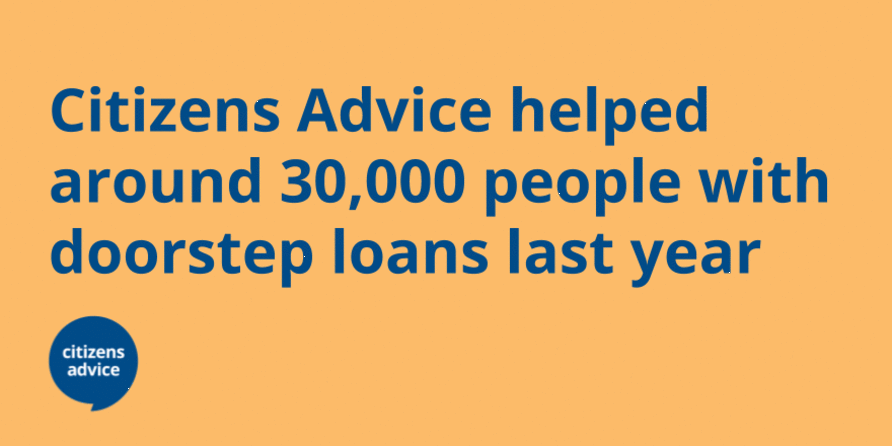Published: Thursday 12 April 2018.
Last reviewed: June 2020. This page is now archived and will no longer be updated.
For the latest advice and information please visit the Citizens Advice website.
 Home credit is one of the largest high-cost credit markets in the UK, with more than than 1.6 million customers. It is also the form of high-cost credit used most commonly by clients who come to us for help with their debts. This new report 'Doorway to Debt' highlights that Citizens Advice helped an estimated 30,000 people who were struggling with home credit debts last year.
Home credit is one of the largest high-cost credit markets in the UK, with more than than 1.6 million customers. It is also the form of high-cost credit used most commonly by clients who come to us for help with their debts. This new report 'Doorway to Debt' highlights that Citizens Advice helped an estimated 30,000 people who were struggling with home credit debts last year.
Problems in the home credit market fall disproportionately on the most vulnerable within society. Our analysis of client data shows that people who are struggling with home credit debts are particularly likely to be in vulnerable circumstances. Clients are typically female, out of work, on low incomes, and living in social housing. Nearly half (48%) have a long-term health condition or disability, compared with 18% of adults in England and Wales. Many are behind on household bills like council tax or water rates.

While home credit borrowing can be a lifeline for many customers, evidence from our advisers suggest that, for clients like these, unaffordable home credit loans contribute to worsening financial situations. Our research highlights three key factors which lead to poor outcomes for consumers:While home credit borrowing can be a lifeline for many customers, evidence from our advisers suggest that, for clients like these, unaffordable home credit loans contribute to worsening financial situations. Citizens Advice research highlights three key factors which lead to poor outcomes for consumers:
- Some clients are offered loans which are unaffordable. Citizens Advice regularly sees cases where clients who are already struggling to keep up with debt repayments are provided with additional credit.
- Customers are taking on multiple loans. A third (34%) of home credit clients had outstanding debt on two or more home credit loans.
- Loan refinancing is causing costs to spiral. We estimate that customers can end up paying more than double what they originally borrowed in interest on up to 490,000 home credit loans.
Citizens Advice are calling on the Financial Conduct Authority (FCA) to extend its definition of high-cost short-term credit to include home credit loans.
The FCA’s regulation of payday lending has been one of its big successes - consumers are paying less for loans and more are able to repay on time. Removing the exclusion which omits home credit from these regulations would provide valuable consumer protections to home credit users, by:
- Limiting the number of times each loan can be refinanced
- Ensuring consumers never pay back more than twice what they borrowed
Citizens Advice estimate that, were existing loans to be priced down to this cap, it could save consumers up to £123m on up to 540,000 loans.
Case study: John*
However, after struggling with repayments due to unexpected bills, he rescheduled the loan to deal with the £300 worth of arrears he found himself in at the end of the arrangement and borrowed an extra £200 to help manage future repayments.
Six months later John found that he was struggling again and approached the lender to reschedule the loan payments again. John now had debts of £1650 and was paying £33 per week.
*client name has been changed
Suzanne Wigmore chief officer at Wiltshire Citizens Advice said
“John’s* experience is not uncommon for people we help with high-cost credit debts, such as doorstep loans and rent-to-own agreements. Low wage growth coupled with a rise in the cost of living means that people on low or insecure incomes are finding it hard to stretch their budgets, pushing many into using high-cost credit to get by.
“People who come to us for help with doorstep loans and rent-to-own contracts were often those most struggling with debt.”
Statistics released by national Citizens Advice earlier this year revealed people with insecure incomes are five times more likely than the rest of the population to use high-cost credit products.
“The use of high-cost credit can be the canary in the cage that people are in financial difficulty,” Suzanne Wigmore said. “People usually end up using these loans because they have nowhere else to turn, and providers of high-cost credit are the only ones who will lend to them.”
Also known as home credit, doorstep loans are a form of borrowing where payments are collected from customers’ homes. Lenders commonly accept borrowers with poor credit histories but the loans are known for their often eye-watering interest rates, with one of the big creditors charging 1,557% for a 13-week loan.
Rent-to-own companies typically charge above RRP for a product such as a fridge or another household item, added to which is the cost of insurance and product protection, all of which the consumer then pays back weekly - typically over three years - at high interest rates, usually paying back way more than the what the product is worth.
On a national level, the numbers are stark. Some 700,000 people took out a doorstep loan in 2016. At the end of that year, 1.6 million people had outstanding debt with an overall value of £1.1 billion. Although fewer people have taken out doorstep loans in recent years, those that do are borrowing more. In 2015, the average value of a new loan was £710, by 2016 this had risen 9% to £770.
About 400,000 people in England and Wales hold a total of £500m of rent-to-own debt, with 200,000 consumers taking out a new loan in 2016. Loans can have annual percentage rates (APRs) as high as 99.9% over the course of three years, as well as punitive late payment fees that add to the original cost.
High-cost credit is usually aimed at people who have low pay packets. People we see struggling with this type of debt are typically females with children and living in social housing. One in two people we saw with a doorstep loan has a long-term health problem; more than one in three with a rent-to-own agreement was between 24 and 34 years old.
High-cost credit is creating problems. Across England and Wales, Citizens Advice estimates it helped 30,000 people last year - about one every four minutes - with issues around doorstep loans - more than any other type of high-cost credit. In the last 12 months we also gave advice to 5,125 people who had problems relating to rent-to-own.
High-cost credit is part of a larger debt picture. People who came to Citizens Advice for help with their home credit debts hold a median of £6,878 in outstanding debt. One third of our clients had outstanding debt on two or more doorstep loans. Those who sought help with their rent-to-own agreements typically held debts totalling £8,000.
John told Citizens Advice that because his doorstep lending agent "had been so helpful to him in the past" he didn't want to fall behind on his repayments again and made sure that this loan was always paid.
But this meant he started falling behind on his priority debts, such as rent payments, and it was the threat of eviction that prompted him to finally seek advice. He said that he felt that his debts were spiralling beyond his control. Following advice, John has set up more realistic loan repayments that he can stick to, and is back on track with his rent account.
To safeguard the vulnerable consumers who are more likely to use high-cost credit, Citizens Advice is now calling for cap on doorstep loans and rent-to-own products, so people do not pay back more than twice what they borrowed. To safeguard the vulnerable consumers who are more likely to use high-cost credit, Citizens Advice is now calling for cap on doorstep loans and rent-to-own products, so people do not pay back more than twice what they borrowed.
A similar cap has been successfully used on payday loans. Citizens Advice saw a fall in people needing help with unaffordable payday loan debts by around half, from more than 16,000 people in 2013-14 to less than 9,000 last year.
You can download a full copy of the Citizens Advice report 'Doorway to debt' below:

